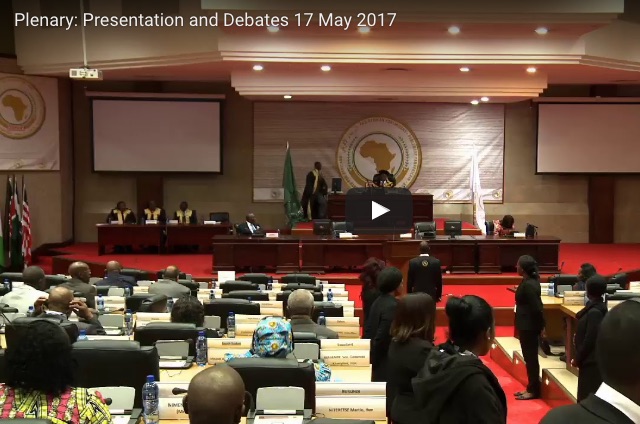FREE FLOW OF INFORMATION
Excerpts from the website of the Pan-African Parliament
The Pan African Parliament (PAP) on Thursday wound up its two-week fourth Ordinary Session of the Fourth Parliament by adopting a total of seven resolutions and five recommendations that are aimed at impacting PAP’s work as well as the wellbeing of the African people.

Video of Parliamentary Session
The PAP has been holding its ordinary session at the Parliament’s Headquarters in Midrand, South Africa since May, 8 and the sitting was kick-started with the special address by Malawi’s and Burkinabe Presidents, H.E Arthur Peter Mutharika and Roch March Kaboré, respectively.
In his closing remarks, PAP President, Honourable Roger Nkodo Dang, described the Ordinary Session as a success, not only because of the various crucial issues that the Parliament discussed but also the presence of the two African Heads of State that graced its official opening on May 8.
The PAP President also expressed gratitude to various dignitaries and experts who interacted with PAP Members and shared with them several experiences and technical knowledge to enable PAP execute its role effectively.
He said the recommendations and resolutions that the PAP Plenary had adopted should enable national parliaments to take an active role towards achieving Africa’s goal of integration and other initiatives to benefit the people of Africa.
The PAP President also expressed gratitude to various dignitaries and experts who interacted with PAP Members and shared with them several experiences and technical knowledge to enable PAP execute its role effectively.
Concept of the African Passport
The House also resolved to promote and support free movement of people in Africa and the African passport through, among other initiatives, raising awareness, popularizing and demystifying the concept of the African Passport and also allaying fears that African countries had concerning free movement of persons within the continent.
(Article continued in the column on the right)
Pan-African initiatives for peace: Are they advancing?
(Article continued from the column on the left)
The PAP members therefore proposed formulation of a Protocol on free Movement of Persons that must be presented before African Union (AU) Heads of State for adoption at their January, 2018 Summit. The House also resolved to draft a Model Law on Free Movement of People in Africa and the African Passport to entrench people’s free movement in the legislation of all African countries.
Towards a borderless continent
Another resolution that the PAP Plenary adopted was the establishment of a Pan-African Parliamentary Forum on Trade, Customs and Migration that would advocate for the ratification and domestication of relevant trade agreements that would eventually advance establishment of One Border Posts across African countries and ultimately a borderless continent with safe migration, cross border trade and protected refugee rights. The forum would also promote regional integration and establishment of Continental Free Trade Area.
Other key resolutions that the PAP Plenary adopted were the resolution on the African transport sector aimed at ensuring that the continental Parliament takes the lead in its oversight role over implementation of AU infrastructure projects particularly those under NEPAD; a resolution on the development of a Model African Law on Police and Model Treaty for Mutual Legal Assistance for Police Cooperation in Africa; and a resolution on the establishment of the PAP Alliance on the Sustainable Development Goals.
The PAP Members also adopted resolutions on Holding of Autonomous Election Observation Missions; Conferment of Observer Status in the PAP to the Parliament of Palestine; and Declaration of Support to Palestinian Prisoners.
The PAP Plenary, in accordance with its Rules and Procedures, also adopted several recommendations pertaining to the parliament, the AU and its organs, Regional Economic Communities (RECs) and AU Member States and their organs and institutions.
The continental Parliament recommended that the AU Policy Organs adopt the Draft Model Law on the Protection of Cultural Property and Heritage and urged AU member states to adopt it and apply it to their domestic legislations. PAP members also recommended that the AU, RECs and African countries adopt and ratify global, continental and regional instruments that were related to women and girls’ rights to access educational systems.